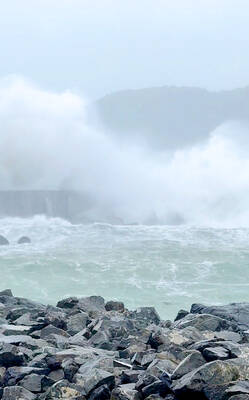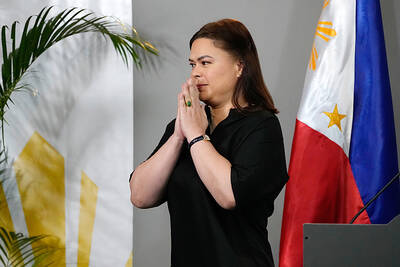The recapture of Fallujah has not broken the insurgents' will to fight and may not pay the big dividend US planners had hoped -- to improve security enough to hold national elections in Sunni Muslim areas of central Iraq, according to US and Iraqi assessments.
Instead, the battle for control of the Sunni city 64km west of Baghdad has sharpened divisions among Iraq's major ethnic and religious groups, fueled anti-American sentiment and stoked the 18-month-old Sunni insurgency.
Those grim assessments, expressed privately by some US military officials and by some private experts on Iraq, raise doubts as to whether the January election will produce a government with sufficient legitimacy, especially in the eyes of the country's powerful Sunni Muslim minority.
Even before the battle for Fallujah began Nov. 8, US planners understood that capturing the city, where US troops are still fighting pockets of resistance, was only the first step in building enough security to allow the election to take place in the volatile Sunni areas north and west of Baghdad.
The next steps include solidifying Iraqi government control, repairing the substantial battle damage and winning the trust of the people of Fallujah.
That requires, among other things, an effective Iraqi police and security force.
General John Abizaid, the commander of all US forces in the Middle East, said during a visit to Iraq this week that the Fallujah offensive was a major blow to the insurgents, and he said the only way the US forces and their Iraqi allies can be defeated is if they lose their will.
"But we are also under no illusions. We know that the enemy will continue to fight," he told the Pentagon's internal news service.
Speaking to reporters on Capitol Hill, Lieutenant General Lance Smith said the military now had to keep the insurgency from regrouping.
"The issue for us at Central Command is make sure we keep the pressure on the terrorists and not allow another safe haven to occur, and we're going to do that," Smith said.
The Associated Press has learned that US military officials in Iraq concluded the population of Anbar province, which includes Fallujah, Ramadi, has been intimidated by the guerrillas and that the provincial security forces are nonfunctioning and their ranks infiltrated by guerrilla sympathizers.
Before the attack on Fallujah began last week, Prime Minister Ayad Allawi formally dissolved the city's police and security forces, which had fallen under control of the radical Sunni clerics who ran the city.
Calls have already emerged for the January vote to be postponed until security improves. Militant Sunni Arab clerics have called for a boycott to protest the Fallujah attack.
However, Iraq's electoral commission is having none of that.
"The election will take place on schedule under laws which cannot be changed because there is no legislative authority to do so," commission spokesman Farid Ayar said Wednesday.
The clerical leadership of the majority Shiite community is also deeply opposed to any delay in the election. The country's premier Shiite cleric, Grand Ayatollah Ali al-Sistani, has been demanding elections since the early months of the US military occupation.
"I don't understand how delaying elections will improve the security situation," Hussain al-Shahristani, a Shiite scientist who is close to al-Sistani. "I believe that the most important reason for the deteriorating security situation in the country is the postponement of elections."
However, pressure for a postponement is likely to increase if the wave of car bombings, kidnappings, assassinations and armed attacks cannot be curbed as the ballot approaches.
Since the Fallujah offensive, there has already been a marked spike in insurgent attacks across other Sunni areas, notably Mosul where about 1,200 US troops launched an operation this week to reclaim police stations abandoned after insurgent raids. US officials say only 20 percent of the city's 5,000 police had returned to duty as of Wednesday.
Despite the risks, holding the January vote on schedule is important for several reasons. It would produce a representative government to replace Allawi's US-backed administration -- seen by many Iraqis as an unwanted legacy of the American occupation.
Voters will choose a 275-member legislature that will draft a permanent constitution. The document will resolve such key issues as whether Iraq adopts a federal system -- a major demand of the country's large Kurdish minority -- or remains a centralized state favored by the Arab majority.

Heavy rain and strong winds yesterday disrupted flights, trains and ferries, forcing the closure of roads across large parts of New Zealand’s North Island, while snapping power links to tens of thousands. Domestic media reported a few flights had resumed operating by afternoon from the airport in Wellington, the capital, although cancelations were still widespread after airport authorities said most morning flights were disrupted. Air New Zealand said it hoped to resume services when conditions ease later yesterday, after it paused operations at Wellington, Napier and Palmerston North airports. Online images showed flooded semi-rural neighborhoods, inundated homes, trees fallen on vehicles and collapsed

‘COST OF DEFECTION’: Duterte’s announcement could be an effort to keep allies in line with the promise of a return to power amid political uncertainty, an analyst said Philippine Vice President Sara Duterte yesterday announced she would run for president of the Southeast Asian nation of 116 million in 2028. Duterte, who is embroiled in a bitter feud with Philippine President Ferdinand Marcos Jr, was impeached last year only to see the country’s Supreme Court throw the case out over procedural issues. Her announcement comes just days before her father, former Philippine president Rodrigo Duterte, begins a pretrial hearing at the International Criminal Court (ICC) in the Netherlands over crimes against humanity allegedly committed as part of a brutal crackdown on drugs. “I offer my life, my strength and my future

FEROCIOUS FISH-EATER Scientists have found a new species of dinosaur from the Cretaceous Period, a ‘hell heron’ that stalked the rivers, deep in the Saharan desert At a remote Sahara desert site in Niger, scientists have unearthed fossils of a new species of Spinosaurus, among the biggest of the meat-eating dinosaurs, notable for its large blade-shaped head crest and jaws bearing interlocking teeth for snaring fish. It prowled a forested inland environment and strode into rivers to catch sizable fish like a modern-day wading bird — a “hell heron,” as one of the researchers put it, considering it was about 12 meters long and weighed 5-7 tons. The dinosaur presented a striking profile on the Cretaceous Period landscape of Africa some 95 million years ago as it hunted

NOT YET THERE: While the show was impressive, it failed to demonstrate their ability to move in unstructured environments, such as a factory floor, an expert said Dancing humanoid robots on Monday took center stage during the annual China Media Group’s Spring Festival Gala, China’s most-watched official television broadcast. They lunged and backflipped (landing on their knees), they spun around and jumped. Not one fell over. The display was impressive, but if robots can now dance and perform martial arts, what else can they do? Experts have mixed opinions, with some saying the robots had limitations and that the display should be viewed through a lens of state propaganda. Developed by several Chinese robotics firms, the robots performed a range of intricate stunts, including martial arts, comedy sketches and choreographed